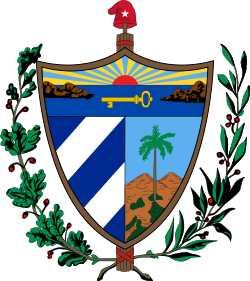 |
|---|
The Congress of Cuba (Spanish : Congreso de Cuba) was the legislature of Cuba from 20 May 1902 until the Cuban Revolution of 1959. [1]
Contents
- Presidents of the Senate 1902–1958
- Presidents of the Chamber of Representatives 1902–1958
- See also
- References
The Congress consisted of the 130-member Chamber of Representatives (Cámara de Representantes) and the 54-member Senate (Senado) in December 1958.
The first Cuban Congress met for the first time on May 5, 1902. Generally, Congress held at least two sessions during a given year. Meetings were interrupted by the Second Occupation of Cuba after the session of September 28, 1906. Following the re-establishment of Cuban-based government in 1909 it met without interruption from January 13, 1909, until April 1933, a few months before President Gerardo Machado was overthrown. During the presidency of Ramon Grau the country's legislative apparatus was largely undertaken by Grau's administration under the auspices of the student revolutionary junta. Commencing with the provisional presidency of Carlos Mendieta a Consejo de Estado (Council of State) undertook advisory legislative functions. The Council of State was abolished in April, 1936 when the Cuban Congress finally resumed its session after three years of inactivity. [2]